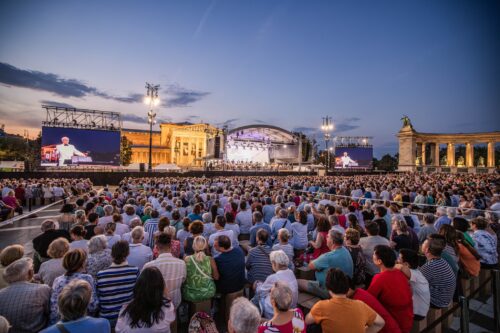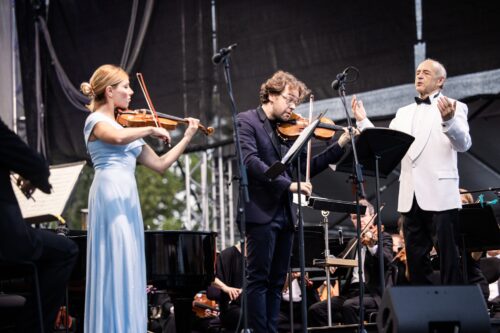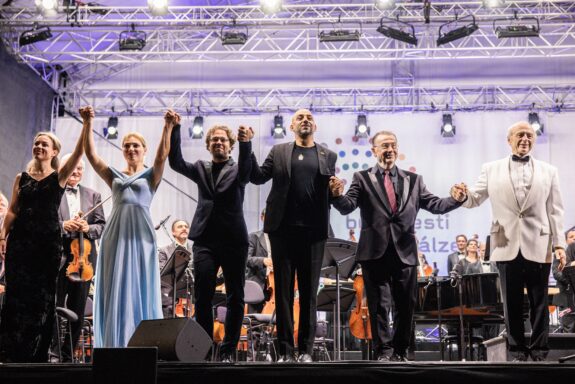 Hungary Concert for Peace – Read Thomas, Bach, Raichel, Mahler: Mirella Hagen (soprano), Diana Tishchenko (violin), Alexander Sitkovetsky (violin), Idan Raichel (voice), Taiseer Elias (oud), Budapest Festival Orchestra / Iván Fischer (conductor). Heroes’ Square, Budapest, 31.8.2024. (AK)
Hungary Concert for Peace – Read Thomas, Bach, Raichel, Mahler: Mirella Hagen (soprano), Diana Tishchenko (violin), Alexander Sitkovetsky (violin), Idan Raichel (voice), Taiseer Elias (oud), Budapest Festival Orchestra / Iván Fischer (conductor). Heroes’ Square, Budapest, 31.8.2024. (AK)

Augusta Read Thomas – Plea for Peace (2017, for soprano and string orchestra)
J.S. Bach – Concerto for Two Violins, BWV 1043
Idan Raichel – Mikol Ha’ahavot; Lifney Shayigamer; Shoshanim Atzuvot
Mahler – Symphony No.3, sixth movement: ‘Was mír die Liebe erzählt’
Iván Fischer and his Budapest Festival Orchestra have been presenting annual concerts free of charge to all at the magnificent and historically important Hősök Tere (Heroes’ Square) for many years.
This year the theme of the concert was peace; it was advertised as ‘Concert for Peace’.
A few days before the concert, in a TV interview Fischer explained that in our current times he felt that the orchestra had to do something to show that peaceful coexistence between warring parties was possible.
The solo performers for this concert consisted of Ukrainian, Russian, Jewish-Israeli and Arab-Israeli musicians, pairing them for their musical items according to current zones of military conflicts.
The programme itself also highlighted the message with the opening piece, the three Hebrew songs above love and Mahler’s subtitle for the sixth movement of his third symphony.
Fischer’s aim was noble and sincere. Unlike other highly publicised musical peace projects, this concert was fully credible with its focus on peace. Performers and the audience united in rejecting war and celebrating peace. (Furthermore, in a TV interview Fischer clearly stated that if he lived in Israel, he would be a peace activist.)
For me, musically the concert was a mixed bag. Half of it delivered astonishingly superb music making, the other half left me uncomfortable.
The first item did have the message clearly spelled out but, leaving the lyrics aside, I was unable to engage either with the composition or with the performer.
The pairing of Israeli-Arab Taiseer Elias (oud) and Israeli-Jewish Idan Raichel (voice) was on message from every dimension but it did not sit easy with me. Professor Elias’s regular musical field is a long way from that of the highly successful versatile pop singer Raichel. They seemed happy together but the highlight fell on Raichel’s fully committed delivery of his pop songs. In spite of the excellent delivery, I am not sure if mixing classical music with pop songs within a concert blends well, even if for the noble aim of uniting all in peace.

The performance of the Bach Double Violin Concerto was a miracle to behold. The two violinists are very different musical personalities. The Ukrainian violinist Diana Tishchenko is elegant, lets the notes speak for themselves while the Russian violinist Alexander Sitkovetsky is fully committed to every note. This time this concerto was truly double, more than just by the number of soloists: we had two different styles presenting counterpoint and perfectly matching each other while also presenting utmost beauty. Conductor Fischer accompanied with modesty and discretion; he stepped back to allow focus on the two violins.
Fischer’s delivery of the Mahler movement is difficult to describe. He took us on a musical journey which was clear in structure, passionate but appropriately measured, and lead us to a deeply moving conclusion: music and peace triumphed.
The concert was filmed and projected onto two large screens, partly to provide surtitles but also to allow good visibility to the stage for the thousands of people in the audience. It is to be hoped that the filming was recorded for future relay: László Kecskés, the director of the screening, provided necessary details as well as a masterclass in the art of musical screening. Alongside Fischer and the soloists, he and the whole orchestra must take shared credit for the success of this evening.
Agnes Kory
Featured Image: the curtain call for Concert for Peace in Budapest’s Heroes’ Square @ Stiller Ákos
